COVID-19

HBCU Funding, Child Tax Credit, Senate Top Staff Diversity & More: May 19 Joint Center Roundup
Biden Administration
Biden’s infrastructure plan gains momentum: Bloomberg reports that “Senate Republicans are set to deliver a revised offer of a package that includes roads, public transportation, and airports to the White House as early as Monday.”

Pregnant Workers Fairness Act: President Biden applauded Congressman Jerry Nadler (D-NY), Congressman Bobby Scott (D-VA), and Congressman John Katko (D-NY) “for their leadership in passing the Pregnant Workers Fairness Act” which will “ensure equal protection in the workforce for women who are pregnant. This is the second time the bill has reached the House floor and it will head to the Senate next.
As mentioned in a previous Joint Center roundup, Congresswoman Lauren Underwood (D-IL), Congresswoman Alma Adams (D-NC), and Congresswoman Ayanna Pressley (D-MA) crafted several bills amplifying Black maternal health and are pushing a legislative package called the Black Maternal Health Momnibus Act. Senator Booker (D-NJ) and Congresswoman Ayana Pressley (D-MA) also introduced the Maximizing Outcomes for Moms through Medicaid Improvement and Enhancement of Service (MOMMIES) Act (summary here) to continue the fight for maternal justice. Earlier this year, President Biden released a proclamation on Black Maternal Health, saying that “ensuring that all women have equitable access to health care before, during, and after pregnancy is essential.”
Standing up against Black LGBTQI+ hate: According to 2021 UCLA data, a large portion of Black LGBT adults “experienced victimization” including verbal insults or abuse (79 percent), being threatened with violence (60 percent), or being physically or sexually assault (44 percent). In a recent statement, President Biden shared “how U.S. diplomacy and foreign assistance are working to promote and protect the human rights of LGBTQI+ persons in line with the different areas of the Presidential Memorandum.” This includes “combating the criminalization of LGBTQI+ status or conduct abroad,” “protecting vulnerable LGBTQI refugees and asylum seekers,” providing “foreign assistance to protect human rights and advance nondiscrimination,” “rescinding inconsistent policies from the previous administration,” and more.
Presidential pardons with racial justice in mind: Several civil rights leaders who met with President Biden last month recently told the New York Times that they left the call with the impression that he “intends to use clemency grants — which are among the most unchecked and profound powers at a president’s disposal — to address systemic issues in the criminal justice system.”
Expanded access to legal representation and the courts: President Biden’s Presidential Memorandum to expand access to legal representation and the courts is a victory for Black Americans. This executive action will hold the Administration accountable and make sure policies and recovery efforts reach communities that have “long struggled to secure quality access to the legal system.” Timely and affordable access can keep individuals out of poverty, help unaccompanied children seek asylum, ensure individuals charged with crime receive a strong defense and gain access to a fair trial, and keep individuals in their homes, issues pertinent to Black Americans’ plight for full freedom. President Biden’s Memorandum is another step to “protect vulnerable Americans, reform the justice system, and advance racial equity.”
Clean energy investments target HBCUs and Black neighborhoods: As part of President Biden’s equity initiative, the Biden-Harris administration invests funds into HBCUs renewable energy research and expands electric vehicle power stations into Black neighborhoods. These efforts aim to diversify energy research and make significant progress in clean energy investments to historically underserved communities.
The Hill
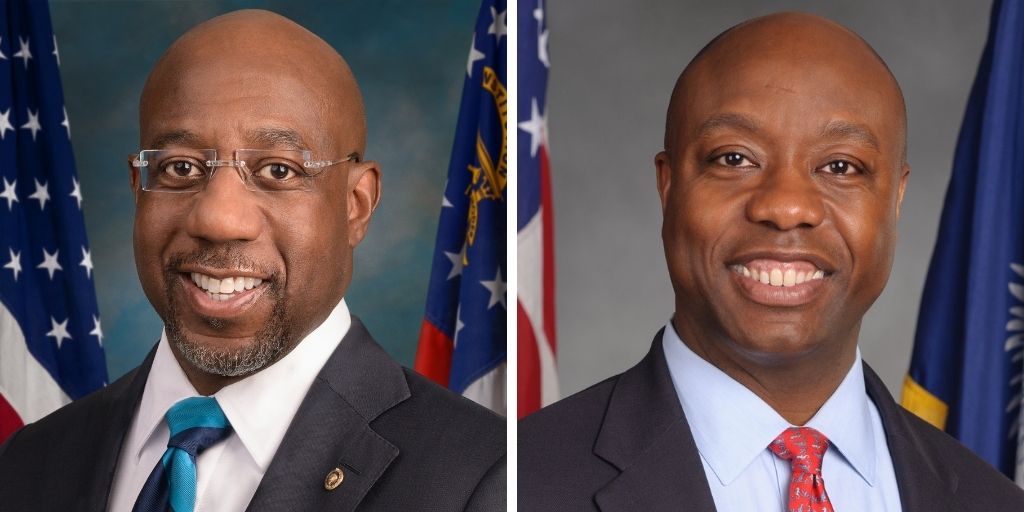
Twenty-two senators support increased HBCU funding: Senator Raphael Warnock (D-GA) and Senator Tim Scott (R-SC) lead the charge formore federal funding for HBCUs which have “historically received less money in gifts from donors and enroll more lower-income students than predominantly white institutions.” In a letter sent on Monday, the Senators note increased federal aid adds to the job creation capacity of HBCUs and supports students’ ability to reap the benefits of receiving an HBCU education.
Fighting to maintain power for Black voters in Chicago: Chicago’s 14 percent Black population decline over the past decade presents a concern for Black politicians.For the past 40 years, Chicago has had three Black representatives in Congress, seats currently held by Congressman Bobby Rush (D-IL), Congresswoman Robin Kelly (D-IL), and Congressman Danny Davis (D-IL). However, the city no longer has three Black-majority congressional districts, a concern for several Black elected officials who already lost their ground on the City Council. Black elected officials “intend to hold their ground” and “ensure that the districts are drawn in a manner that allows for all people to have representation.”
Congresswoman Val Demings plans to run for U.S. Senate: Congressional Black Caucus member Congresswoman Val Demings (D-FL) plans to run for Senate in the next election against two-term Senator Marco Rubio (R-FL). Alongside her accomplishment of being Orlando’s first Black woman police chief, Congresswoman Demings (D-FL) also became the national Democratic spokesperson for policing and race issues and made it on President Biden’s shortlist of possible running mates in 2020. Supporters state the biggest challenge for Congresswoman Demings (D-FL) will be voter registration and turnout.
Former CBC Chair Bass discusses the George Floyd Justice in Policing Act: Former Congressional Black Caucus Chair Congresswoman Karen Bass (D-CA) joins attorney Angela Rye todiscuss the myths, misconceptions, and bill language of the George Floyd Justice in Policing Act.
Remembering Otto Beatty Jr.
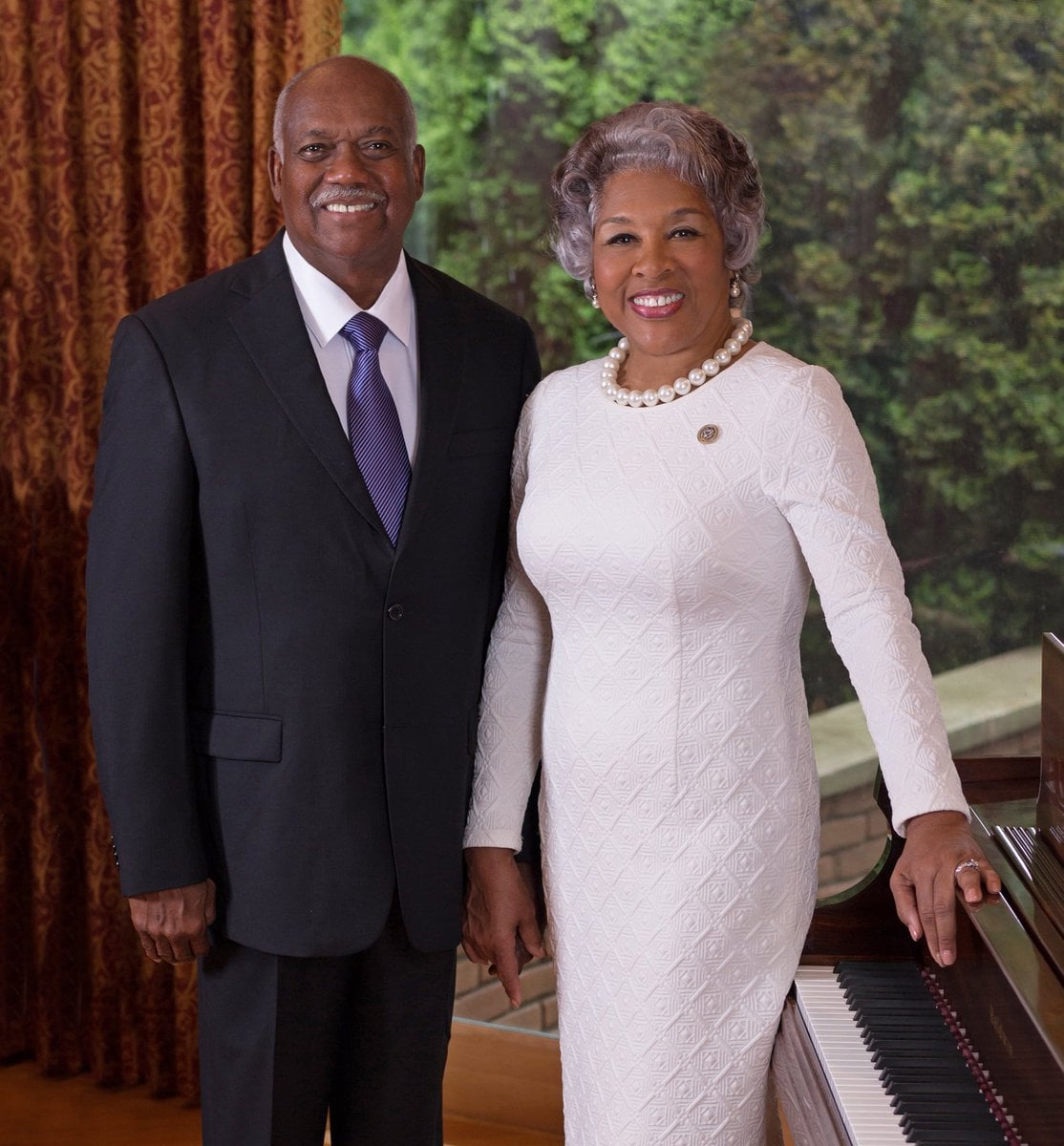
The Joint Center mourns the passing of Otto Beatty Jr., a former state lawmaker, a champion for Black businesses, “leader in the fight for racial equality in Ohio,” and husband of Congressional Black Caucus Chair Joyce Beatty.
“Otto Beatty Jr. was an essential voice for Black businesses and communities in Ohio and our nation, and we’re so appreciative of his leadership,” said Joint Center President Spencer Overton. “We extend our condolences to his wife Congresswoman Beatty, his son Otto, his daughter Laurel, and the rest of his family. They are all in our prayers.”
Appointments
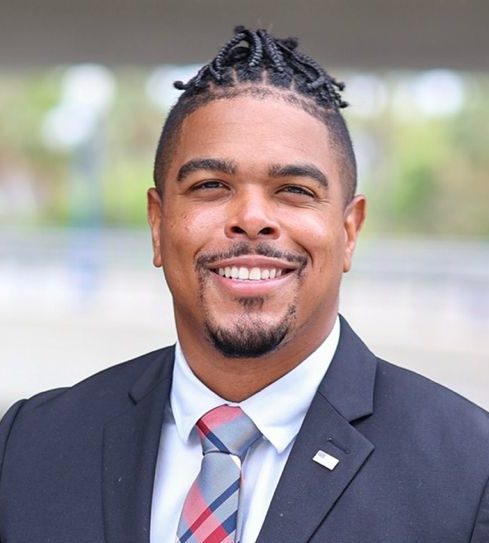
Biden appoints Laurence Wilson as Advance Representative to Secretary Xavier Becerra at the Department of Health and Human Services. Mr. Wilson was previously the CEO and Founder of Wilson Brand. He also served as a National Advance Associate for the Biden for President campaign.

Biden appoints Charisma Troiano as Deputy Press Secretary in the Office of Public Affairs at the Department of Energy. Ms. Troiano recently served as the Director of Communications for Democracy Forward. She has previously served as the Press Secretary for the Brooklyn District Attorney’s Office.
Economic Policy
Cutting child poverty: In July, 39 million families will begin to receive a monthly benefit of up to $300 per child from the temporary expansion to the Child Tax Credit (CTC). The American Rescue Plan combined both a CTC and an Earned Income Tax Credit (EITC) expansion that would lift 1.3 million Black children out of poverty and make 5.7 million Black children eligible for the maximum CTC. Many advocates are pushing for expansions to both the CTC and EITC to be made permanent.
Young Black workers face bias: A new study shows that age discrimination varies across race, with Black workers facing more discrimination than white workers at younger and much older ages, while white workers face more age discrimination than Black workers in the middle ages.
Higher education, less financial fallout: Almost half (49 percent) of Black adults with a college degree say their personal financial situation is in good shape following the pandemic versus only 30 percent Black adults with some college or less, according to Pew Research.
Policies decimated the middle class: Intentional policy decisions have caused decades of suppressed wage growth, two economists from the Economic Policy Institute argue in a new paper.
Pay women fairly, cut poverty: Noting that Black women and Latinas are represented disproportionately among low wage workers, a new study shows that gender pay equality would reduce the poverty rate of working women in every state. If the gender wage gap were closed across the US, the poverty rate for working women would fall from 9.5 percent to 5.5 percent.
Tech Policy

“Techno-racism” opens new battleground: The fight for civil rights and racial justice now extends to techno-racism — digital technologies that discriminate, such as facial recognition software or risk assessment algorithms in mortgage lending. One study found that facial recognition algorithms misidentified Black faces 10 times more often than white faces. Seminal research conducted by Joy Buolamwini and Dr. Timnit Gebru first explored the accuracy of automated facial analysis algorithms based on race and gender.
AI bias hurts consumers: U.S. House Financial Services Chair Maxine Waters (D-CA) is calling for legislation to address artificial intelligence (AI) discrimination in lending. During a hearing of the Financial Services AI Task Force, members noted algorithms’ impact on consumers, ranging from access to quality credit to eligibility for bail after an arrest. The Joint Center is currently working on a report that explores the use of automated-decision making technologies in employment, housing, and credit/lending.
A well-meaning algorithm backfires: A new study shows that an Airbnb pricing algorithm opt-in inadvertently widened the income gap between Black and white hosts. Low uptake of the pricing algorithm by Black hosts on Airbnb’s platform widened the revenue gaps between Black and white hosts by $14.30 per host. The author states that “…even a well-meaning algorithm can lead to greater social inequality . . . there are unintended consequences of algorithms.”
“Responsible” AI takes root at Google: Dr. Marian Croak, who heads the new center of expertise on responsible AI at Google, announced plans to double the size of the ethics team. The effort follows the controversial firing of prominent AI ethics team member Dr. Timnit Gebru, a Black scientist and critic of Google’s artificial intelligence policies. Croak is one of the few senior Black executives at Google. Last month, Color of Change called for Google to allow independent auditors to investigate the company’s business for potential discriminatory conduct.
No Facebook for Trump, for now: Civil rights and watchdog groups applauded the Facebook Oversight Board’s decision to maintain Facebook’s suspension of former President Donald Trump from the platform. The suspension was in response to his inciting an insurrection at the U.S. Capitol on January 6.
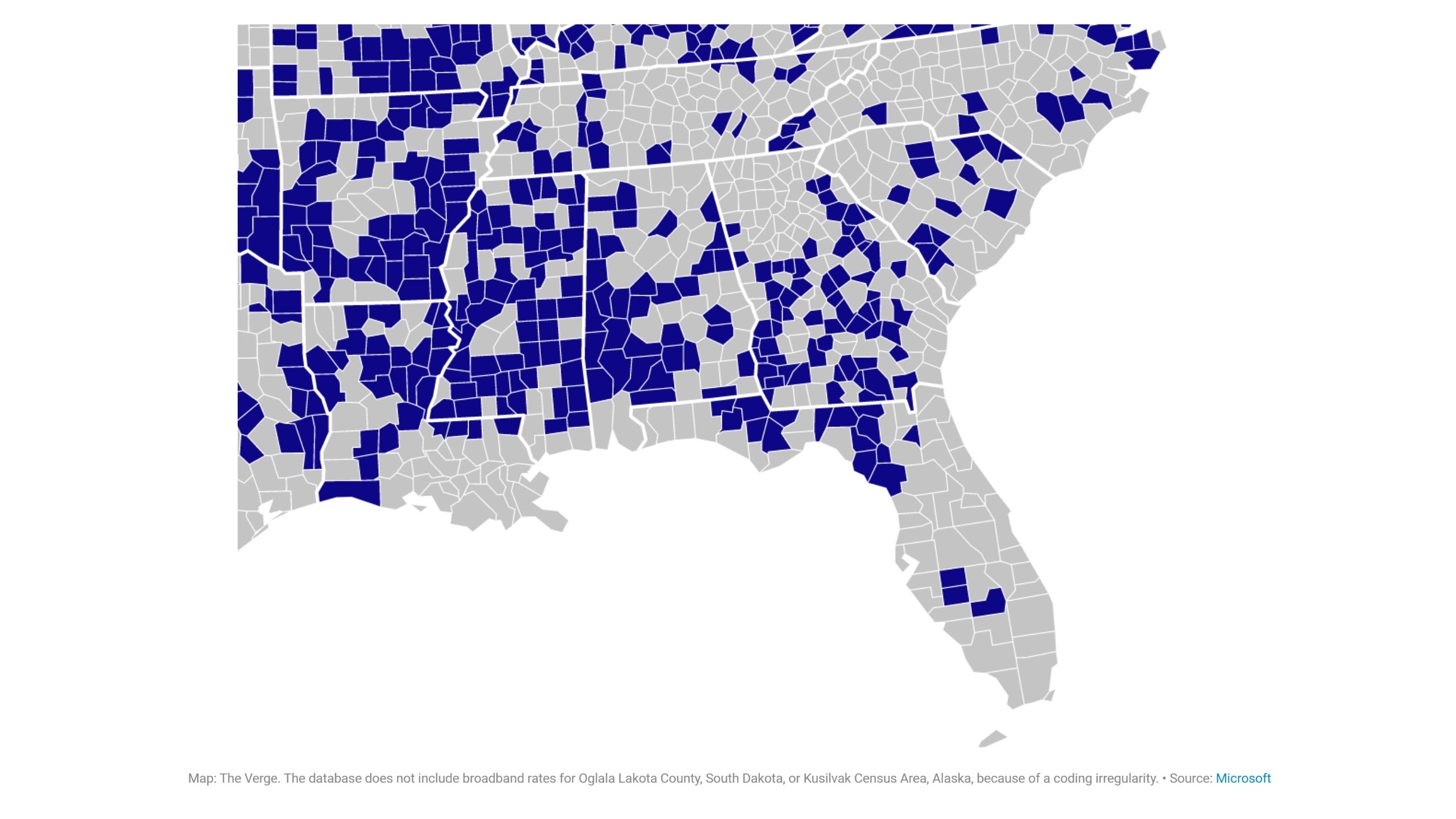
Where high-speed internet isn’t: A new map of the digital divide shows the many counties (those in blue) where less than 15 percent of residents are connecting at broadband speeds (25Mbps or more), presenting a significant barrier for online learning and other activities made necessary by the COVID-19 pandemic.
Future of Work & Learning
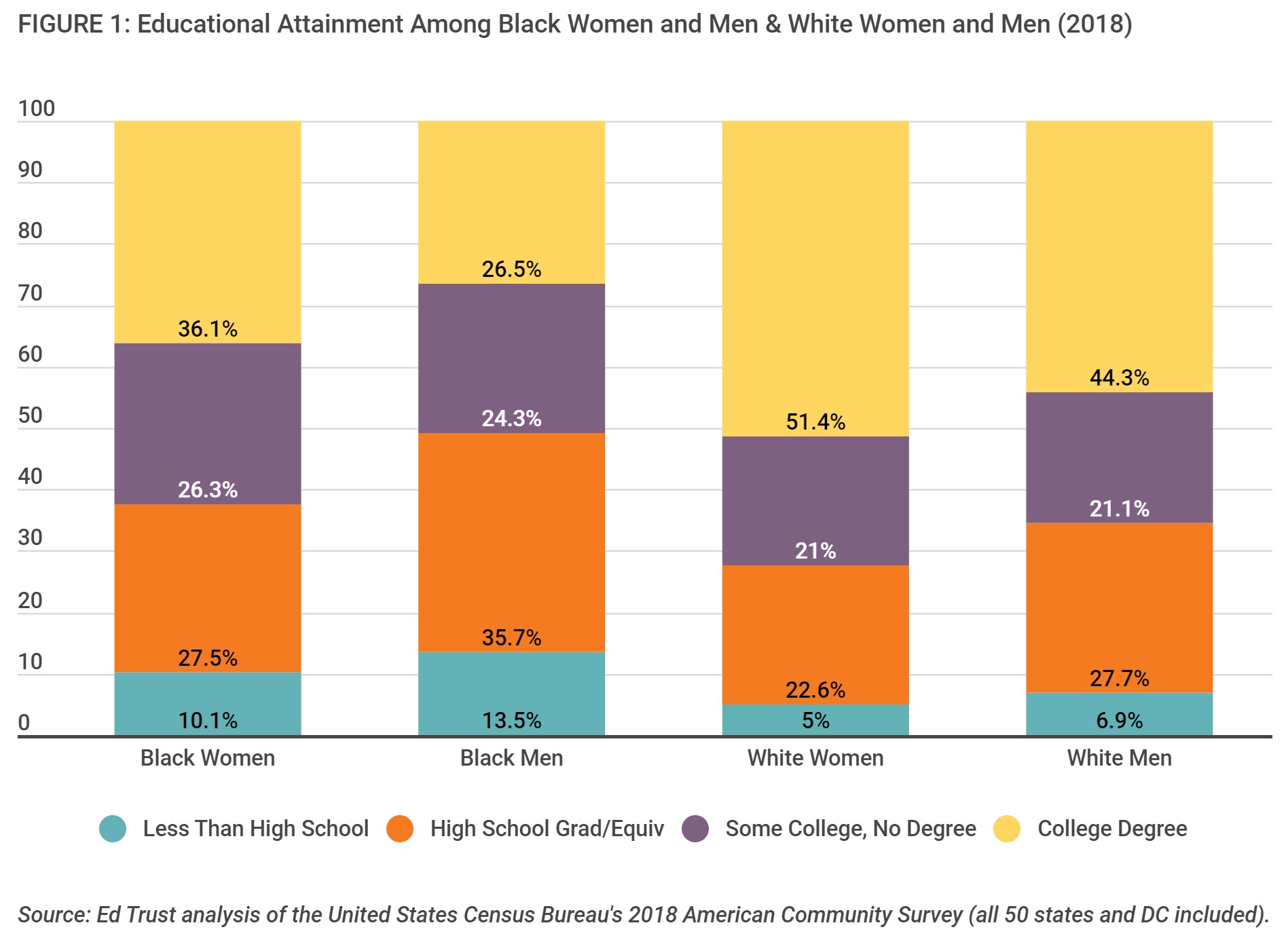
College enrollment dips: COVID-19 exacerbated racial disparities in education, leading to a renewed urgency to increase the number of Black adults with a college degree, argues the Education Trust. Black undergraduate enrollment overall was down 7.5 percentage points last fall, while first-time enrollment dropped by 19 percentage points. For Black men, enrollment at community colleges dropped by 19.2 percentage points and 9 percentage points for Black women.
States short HBCUs: For decades Tennessee has withheld funding from its HBCU, Tennessee State University, a state bipartisan legislative committee finds. The state’s failure to adequately fund the university since the 1950s has cost the HBCU as much as $544 million. Maryland has also underfunded its HBCUs, NPR finds.
The costs of education disparities: Racial and economic injustice in higher education costs the nation more than $956 billion annually. If all people of color had at least the same level of postsecondary education as white Americans, 5.9 million more Black people would have an associate’s degree or higher. Equity in higher education could create $308 billion in annual increased tax revenue and $542 billion in increased gross domestic product annually, among other monetary gains.
Education as social justice: Higher education is key to economic mobility and social justice, a report by the Postsecondary Value Commission finds. The commission cites gaps in access, completion, and post-college outcomes for Black people and other groups. Nearly half (48 percent) of white adults aged 25-64 had at least an associate’s degree in 2018 versus 32 percent of Black adults. The high costs of higher education, inadequate support while enrolled, and racial and socioeconomic stratification across and within colleges contribute to the disparities.
Cutting federal UI hurts Black workers: Twelve states (and counting) are ending the emergency federal unemployment insurance benefits, and Black workers will be among the hardest hit. Fifty percent of South Carolina’s unemployment insurance recipients are Black, as are 54 percent of Alabama’s and 66 percent of Mississippi’s—at least three times the national average of 18 percent.
COVID-19
Vaccine parity inches closer: Although race-based disparities in COVID-19 vaccination rates have grown in some areas, some state and federal data indicate that the country is making progress in closing racial gaps and achieving vaccine parity nationally. In Mississippi, for example, Black people compose 38 percent of the population and 34 percent of those vaccinated in the state.
Except in Florida: Only 7 percent of Florida’s vaccinated residents are Black, prompting Governor Ron DeSantis to step up vaccination efforts to reach Black communities. About 20 percent of the state’s Black residents have been vaccinated compared to 38 percent of white residents.
The endgame: herd immunity: Racial differences in vaccine acceptance have narrowed—as of April, 20 percent of Black people and 19 percent of white people have refused vaccinations—but the last mile may be the hardest as the country aims for herd immunity, Brookings argues.
Confusion drives vaccine hesitancy: Misinformation and disinformation are the primary drivers of vaccine hesitancy in the Black community, said Drs. Cameron Webb and Marcella Nunez-Smith, senior members of the White House COVID-19 Response Team. Lack of concern about contracting the virus, distrust of the institutions offering the vaccines, and lack of convenient access to vaccines are other reasons for the reluctance.
Addressing health inequities: To address the health inequities experienced during the coronavirus pandemic, Healthline recommends acknowledging that the experiences of people of color are not all the same and increasing diversity in the medical field. According to the article, “in order to get to herd immunity most experts say we need at least 80% of the population vaccinated, evenly enough distributed across the population to avoid hot spots.”
Political Studies
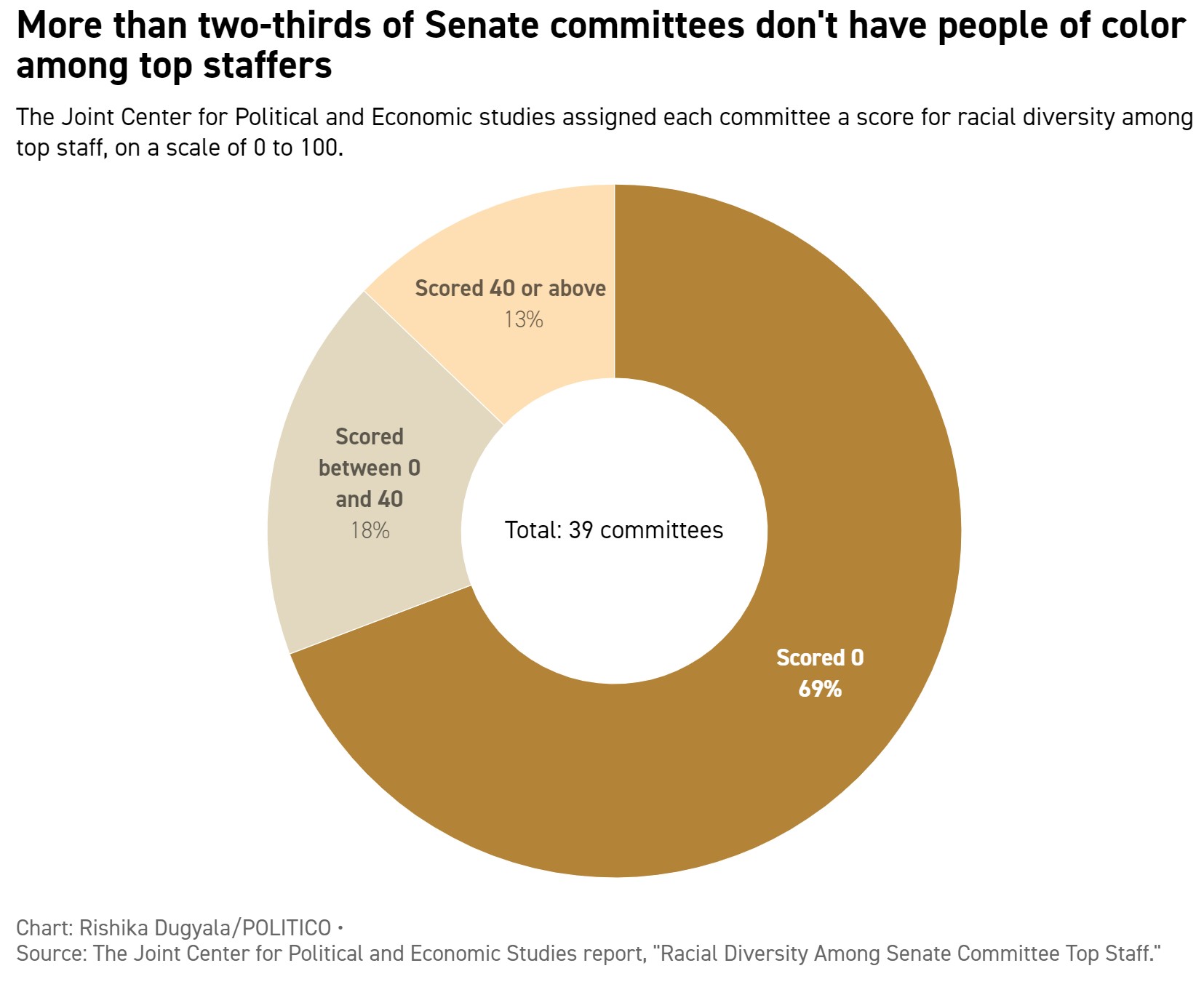
Joint Center tracks racial diversity among Senate committee top staff: The Joint Center launched an interactive report card (exclusively covered in Politico) allowing users to learn how U.S. Senate full committee chairs and ranking members are faring when it comes to hiring diverse top staff (staff director, deputy staff director, chief counsel, general counsel, and policy director) in their committee offices.
Out of the 39 committee offices, almost 70 percent have no racial diversity among top staff (11 Democratic offices, 15 Republican offices, and one Bipartisan office). People of color account for 39 percent of registered Democratic voters and 14 percent of registered Republican voters. Unfortunately, 83 percent of the Democratic committee offices fail to reflect the nation’s diversity among their top staff (diversity scores that fall below 40), and 89 percent of Republican committee offices fail to reflect the nation’s diversity among top staff.
Congress pressed to diversify: Kemba Hendrix, head of the House Office of Diversity and Inclusion, called for more diversity among congressional staffers at a hearing of the House Committee on the Modernization of Congress. The key will be moving beyond internships and college recruiting to ensure that paths to higher positions are clear and welcoming, she and others on the committee noted. Only 11 percent of top Senate staffers are people of color, according to Joint Center research, and our 2018 report showed that less than 14 percent of top House staff were people of color.

361 bills restricting voting and counting: The Senate deadlocked on national voting legislation, as the future of voting rights hangs in the balance. The proposed legislation, the For the People Act, would adopt federal changes that would blunt new, more restrictive voting laws in some states such as Georgia and Florida. Lawmakers in 47 states have introduced 361 bills this year to limit voting access, according to Brennan Center for Justice and CNN.
Movement Building
Color of Change issues a petition demanding state governors to stop anti-protesting laws from passing and protect the right to protest.
A Better Balance, Adelante Alabama Worker Center, the Alabama AFL-CIO, and Jobs to Move America host virtual workshops about workplace health and safety and wage and hour regulations for Alabama workers.
Black Voters Matter “We Got the Power” tour heads to Philadelphia, PA to educate the community about the May 18 election.
SisterReach reactivates their COVID-19 community emergency fund to provide food, housing and utility assistance, and masks to the Memphis, TN community.
Events
Upcoming events include “What Biden’s First 100-Days and Proposed Infrastructure Plan Means for Broadband” (TPRC, May 20); “Encouraging Job Quality in Small Businesses: Advising, Lending, and Procurement Approaches” (Aspen Institute, May 20); “Shaping America’s Education Agenda: Pushing Boundaries” (Rainbow PUSH Coalition, May 20); “Saving the Lives of Moms & Babies: Addressing Racism & Socioeconomic Influencers of Health” (National Birth Equity Collaborative and National Partnership for Women & Families, May 20); “Cannabis reform as a pathway to racial justice and opportunity” (Brookings Institution, May 25); “Health Care Innovators” (Politico, May 25); “Advancing Equity in the Workforce Ecosystem” (Workforce Matters and WorkingNation, May 26); “Strategies for Protecting Communities of Color in the DMV Region: Defunding the Police and Exploring Other Alternatives to Policing” (Urban Institute, June 10).
Last week, events were held by Black Freedom Lectures, Boston Globe, Brookings Institution, Center for American Progress, House Committee on Education and Labor, Knight Foundation, and Politico.
Podcast
Defining and Measuring ‘Value’ in Postsecondary Education (Inside Higher Ed)
The Joint Center thanks the Annie E. Casey Foundation, the Boulé Foundation, the Democracy Fund, Toyota Motor North America, Inc., UPS, and the Walmart Foundation for additional support that has allowed us to do some of our COVID-19 and Black Communities work.
To receive the Joint Center’s emails, sign-up here.

